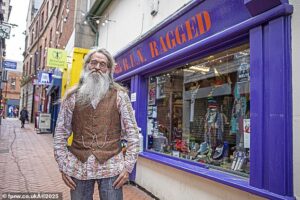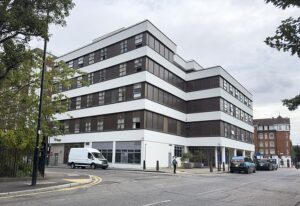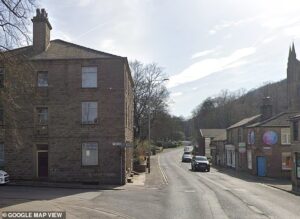By QUENTIN LETTS, PARLIAMENTARY SKETCHWRITER
Published: | Updated:
High August is when childhood’s freedoms are forged. The school holiday stretches to the horizon, offering endless scope for adventure. While parents continue to work, youngsters have days to fill as they please. It’s Liberty Hall.
But for how much longer? An American shoe company has come up with the idea of inserting Apple AirTags inside trainers. Wherever children are, parents will be able to track them.
‘Feel secure with new Skechers AirTag compatible shoes,’ runs the advert for these £55 trainers. They come with a hidden compartment in the heels, which can accommodate a £35 metal disc the size of a clock battery. These use Bluetooth to connect to Apple computers. The rest is pure Orwell.
From breakfast to bedtime, parents will know exactly where their offspring (or at least their training shoes) are. Children will be as trackable as convicts wearing ankle monitors.
‘What a good idea,’ some people may say. ‘If James Bulger had been wearing such a device, he might still be alive.’ The fate of the two-year-old, missing for two days in 1993 before his murdered body was found, was indeed dreadful. And yet my instincts bridle at these Skechers shoes. Dreadful tragedies should not make us surrender the valuable things in life.
Growing up in a Gloucestershire market town half a century or so ago, my summer holidays were a time of burgeoning independence. My parents were often busy. They ran a boarding school and there was plenty for them to do, even outside term-time.
So my brother Alexander and I had to find our own entertainment. We would go down to a nearby spinney called The Wilderness and dam a brook or hunt for snakes. Alexander had an air rifle and we would shoot pellets at the neighbours’ washing, hoping to put holes in poor Mr Linter’s underpants as they dried on the line.
We earned a few bob by washing cars at the well-to-do houses. No one ever said, ‘Does your mother know where you are?’ In those days, people were less anxious about such things.
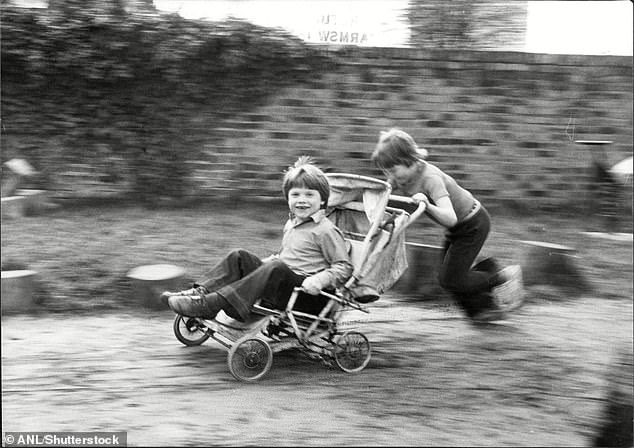
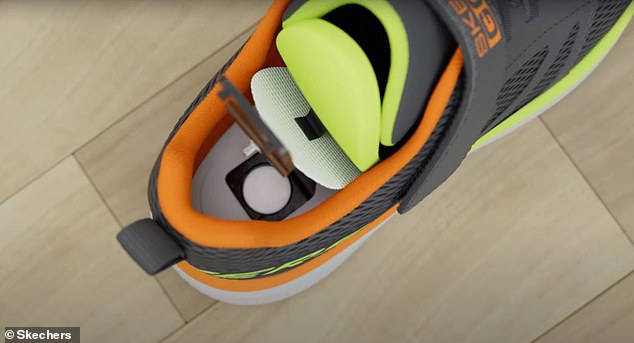
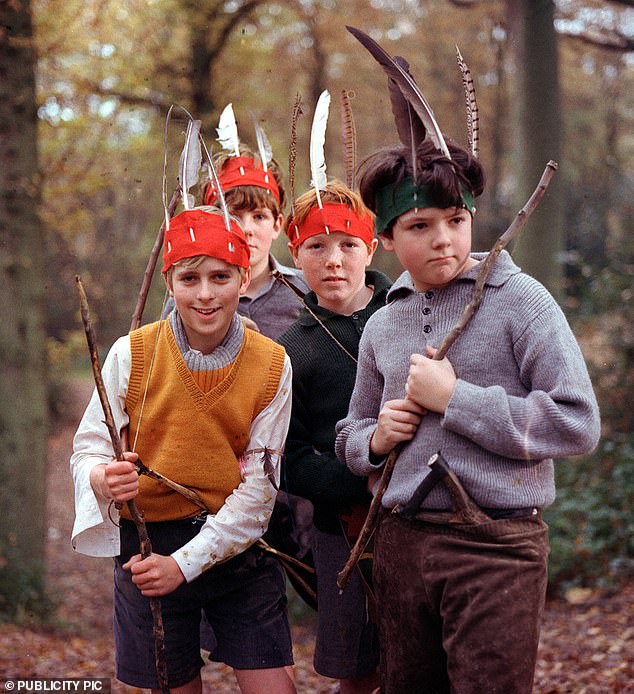
Sometimes Alexander went to stay with a friend his own age (he was four years older than me) and I was left to my own devices. Aged eight, I would go for four-mile bicycle trips to Kemble, to stand on the railway bridge and watch blue InterCity trains rush past. It wasn’t quite The Railway Children but it kept me occupied.
Locomotives were not the sole attraction. There were blackberries in the hedgerows, dusty and sour but one still ate them. There was also the agreeable palaver of unpacking the picnic my mother had made – a big, flour-dusted bap from Ann’s Pantry and some boring apple, which I would give to a pony near Siddington.
As a child, I was mad about cars. In my imagination, my bicycle became a gleaming roadster and I would make double de-clutch noises as I pedalled the lanes.
Lorries from a gravel pit used the route and I was frightened of them, so would wait on the verge while they passed.
Other days I would cycle into town – the wicked metropolis of Cirencester – and spend fruitless hours fishing in the River Churn. I remember, when about ten, stopping at Trinder’s newsagent’s to buy a packet of No 6 cigarettes. Miss Ellis, the counter assistant, sold them without demur. In great secrecy I tried one of those cigs and thought it disgusting. The packet was discarded.
Throughout boyhood, I was given freedom to roam. At Woolworths, buying sweets, I grandly said, ‘Keep the change’, to the woman on the till. She kindly told me to keep it for a rainy day. Looking back, one no doubt romanticises it.
I may have cycled to Kemble only a couple of times. That brook in The Wilderness was little more than a dribbling spring. Those frightening lorries probably decelerated at the sight of a boy on his bicycle and gave me a wide berth. And I bet my mother often had a rough idea of what her boys were doing.
But we did not know that. We reckoned we were free and that made us feel grown-up. And that notion of liberty was, and is, precious.


By the age of 11, I was taking the bus to Cheltenham to watch county cricket. I had a few coins for an ice cream but there was no chaperone and certainly no mobile phone. Even if I had rung my parents’ landline, there was no guarantee anyone would answer. My father’s secretary only worked mornings.
All the more reason, you might say, for Skechers AirTag shoes. They would have brought peace of mind to my parents. Yet something would have been lost, on two fronts. August’s freedom not only allows a child to feel independent but also helps adults to start to let go.
We can’t spend the whole of our time as parents in a state of anxiety. This is a lesson lost on today’s so-called helicopter parents, always hovering over their children. They try to wrap children in cotton wool. They fret ceaselessly. They try to second-guess fate – and, ultimately, they leave their children more vulnerable.
This fever of caution is starting to consume our society. It paralyses us. It stunts initiative. And it is evident on a wider, political level, with ever-spiralling rates of regulation and supervision.
A London acquaintance has seen youngsters being given ‘forest days’ on Wandsworth Common. The children are made to wear high-vis bibs and are tethered together by reins. ‘Running free’ is hardly the expression that comes to mind. No doubt the organisers have been obliged, by insurance companies or council edicts, to conduct risk assessments. They will have promised parents that their children will come to no harm.
The heart sinks. Only by encountering danger do you learn to avoid it. If you never singe your fingers, you are more likely one day to go down in flames.
Anyway, those reined children, when they get home and look at their mobiles, will probably face greater dangers online than anything that might have been waiting to jump out at them from the bushes on Wandsworth Common.
Life is full of potholes and children must learn to assess their own risks. If you wish to give a modern health and safety inspector an attack of the vapours, try mentioning the old game of ‘chicken’. Children of my generation would lie on the road and move only at the last minute before a car passed.
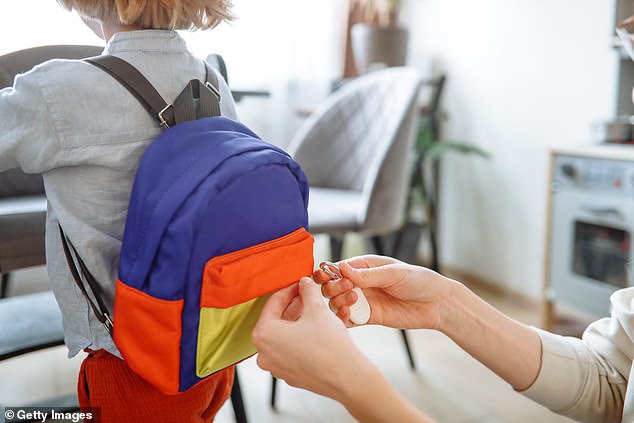
My friend Willy Price and I used to risk our necks by riding our bicycles down a steep woodland slope at the back of his garden in Hereford. At lunchtime, Willy’s mother would ask if we had been behaving ourselves and we would assure her we had been angels. Mrs Price was a wise woman and I doubt she believed a word.
As a child, would you have wanted your parents to monitor your every movement? Might you not have reached into that heel compartment and thrown the snooping device into August’s long grass? Might you not have kicked off your shoes and scampered away barefoot?
Children must be allowed to navigate life’s dangers without Mummy and Daddy forever fussing over them. Let’s give these Skechers shoes the boot.
l NUNC! by Quentin Letts is published by Constable.


